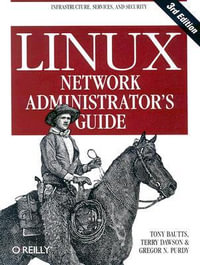
At a Glance
432 Pages
23.5 x 19.05 x 3.18
Hardcover
RRP $140.95
$131.75
or 4 interest-free payments of $32.94 with
orShips in 5 to 7 business days
Multiprotocol Label Switching (MPLS) is a data plane and control technology that is used in packet (that is Internet Protocol) networks. Now over ten years old, it has taken root firmly as a fundamental tool in many service provider networks. The last ten years have seen a considerable consolidation of MPLS techniques and protocols. This has resulted in the abandoning of some of the original features of MPLS, and the development of other new features. MPLS has moved from a prospective solution, to a grown-up technology. Now that MPLS has reached this level of maturity, these new tools and features allow more sophisticated services to the users of the network. These tools and features are discussed within various contexts throughout several networking-related books published by MK and this presents us with a unique publishing opportunity.
The proposed book is a best-of-the-best collection of existing content from several books MK has published in recent years on MPLS technology (multi-label protocol switching). Individual chapters on MPLS technology are derived from a handful of MK books and are combined in one new volume in a way that makes sense as a reference work for those interested in new and developing aspects of this technology, i.e., network operators and designers who need to determine which aspects of their networks would benefit from MPLS technology and applications. It also serves as a definitive reference for engineers implementing MPLS-based products.
This book represents a quick and efficient way to bring valuable content together from leading experts in the field while creating a one-stop-shopping opportunity for customers to receive the information they would otherwise need to round up from separate sources. Suitable and current content will be collected from the following titles: Evans, Deploying IP and MPLS QoS (2006); Farrel, GMPLS (2005); Ash, Traffic Engineering (2006); Vasseur, Network Recovery (2005); Farrel, The Internet and Its Protocols (2004); Nadeau, MPLS Management (2003); and Davie, MPLS Technology and Applications (2000). These chapters will be updated where necessary and two new chapters will be added at the beginning and the end of the book to bring the content into focus and discuss next generation developments.
* Coverage of major applications of MPLS such as traffic engineering, VPNs, IP integration, GMPLS, and QoS written by leading experts in the field contributes to your practical knowledge of this key technology
* Shows you how to implement various MPLS applications that will result in saving your organization time and money
* Shows you how you can evaluate MPLS applications and techniques in relation to one another so you can develop an optimum network design
Industry Reviews
-Daniel Awduche Distinguished Technical Member UUNET (MCI Worldcom)
"At last a comprehensive presentation of MPLS reflecting its development and usage, this book is a MUST for any Network Engineering Manager contemplating the deployment of MPLS."
-Monique Jeanne Morrow IP Engineering Manager Swisscom AG
"Davie and Rekhter provide a detailed and unbiased chronology of the evolution of MPLS. Their scientific approach to decomposing various protocols into their fundamental elements is interwoven with a more pragmatic compilation of diagrams, typical networking scenarios, and applications. Provides a solid knowledge base for researchers and operators dedicated to MPLS and its future."
-Eric Dean Senior Director, Internetwork Engineering Global One
| About the Editors | p. xi |
| About the Authors | p. xiii |
| Introduction | p. 1 |
| Source Material | p. 2 |
| Contents of this Book | p. 4 |
| MPLS Basics | p. 7 |
| Overview of the MPLS Data Plane | p. 9 |
| Network Layer Routing Functional Components: Control and Forwarding | p. 9 |
| Label Switching: The Forwarding Component | p. 12 |
| Label Switching: The Control Component | p. 23 |
| Edge Devices | p. 28 |
| Relationship between Label Switching and Network Layer Addressing and Routing | p. 29 |
| Overview of MPLS Protocols | p. 31 |
| Foundations of MPLS Protocols | p. 31 |
| Label Distribution Protocol (LDP) | p. 32 |
| Traffic Engineering in MPLS | p. 45 |
| Prioritizing Traffic in MPLS | p. 53 |
| From MPLS to GMPLS | p. 55 |
| The Origins of GMPLS | p. 55 |
| Basic GMPLS Requirements | p. 57 |
| Advanced Techniques | p. 65 |
| Traffic Engineering | p. 67 |
| What Is IP Traffic Engineering? | p. 67 |
| Routing IP Flows | p. 68 |
| Choosing Offline or Dynamic Traffic Engineering | p. 70 |
| Choosing to Use Traffic Engineering | p. 71 |
| Traffic Engineering in MPLS | p. 72 |
| GMPLS and Traffic Engineering | p. 80 |
| GMPLS Traffic Engineering Definitions | p. 91 |
| GMPLS Traffic Engineering Protocols | p. 100 |
| Traffic Engineering Link Bundling | p. 102 |
| Traffic Engineering Regions and Switching Layers | p. 104 |
| Inter-Domain Traffic Engineering | p. 112 |
| Service Path Re-Optimization | p. 118 |
| Providing Quality of Service | p. 119 |
| What is Quality of Service? | p. 119 |
| MPLS Traffic Engineering for QoS | p. 124 |
| Traffic Engineering and QoS Optimization of MPLS-Based Integrated Voice/Data Dynamic Routing Networks | p. 132 |
| Class-of-Service Routing | p. 136 |
| Dynamic Bandwidth Allocation, Protection and Reservation Principles | p. 140 |
| Queuing Mechanisms | p. 151 |
| Internet QoS Resource Management | p. 152 |
| Summary and Conclusions | p. 154 |
| Applicability of Requirements | p. 154 |
| MPLS Traffic Engineering Recovery Mechanisms | p. 157 |
| MPLS Traffic Engineering Terminology | p. 157 |
| Analysis of the Recovery Cycle | p. 162 |
| MPLS Traffic Engineering Global Default Restoration | p. 165 |
| MPLS Traffic Engineering Global Path Protection | p. 170 |
| MPLS Traffic Engineering Local Protection | p. 172 |
| Another MPLS Traffic Engineering Recovery Alternative | p. 188 |
| Comparison of Global and Local Protection | p. 189 |
| Revertive versus Nonrevertive Modes | p. 200 |
| Failure Profile and Fault Detection | p. 202 |
| Standardization | p. 208 |
| Summary | p. 208 |
| RSVP Signaling Extensions for MPLS TE Local Protection | p. 209 |
| Backup Path Computation | p. 223 |
| GMPLS and Service Recovery | p. 261 |
| Failures in Transport Networks | p. 262 |
| Network Survivability Definitions | p. 262 |
| Service Recovery Cycle | p. 264 |
| Service Recovery Classes | p. 267 |
| Recovery Levels and Scopes | p. 269 |
| Span Recovery | p. 271 |
| Path Recovery | p. 279 |
| Control Plane Recovery | p. 305 |
| Operations, Management, and Security | p. 311 |
| Management Techniques | p. 313 |
| Key Aspects of MPLS Network Management | p. 313 |
| Management Information Base Modules for MPLS | p. 318 |
| MPLS-LSR MIB at a Glance | p. 320 |
| Managing LDP | p. 323 |
| The MPLS FTN MIB | p. 323 |
| The MPLS-TE MIB Overview | p. 325 |
| MIB Extensions for Advanced MPLS-TE Function and GMPLS | p. 326 |
| Monitoring and Maintenance | p. 335 |
| LSP Ping | p. 335 |
| LSP Traceroute | p. 338 |
| Bidirectional Forwarding Detection | p. 339 |
| Virtual Circuit Connectivity Verification | p. 340 |
| MPLS Security | p. 343 |
| Introduction | p. 343 |
| Network Model | p. 344 |
| Threats | p. 344 |
| Defensive Techniques | p. 347 |
| Summary | p. 350 |
| Providing Services with MPLS | p. 351 |
| Virtual Private Networks | p. 353 |
| VPN Overview | p. 353 |
| MPLS VPNs | p. 359 |
| MPLS VPN Security | p. 360 |
| QoS Support in MPLS VPNs | p. 361 |
| Choosing a VPN Technology | p. 365 |
| Pseudowires | p. 371 |
| Pseudowire Architecture | p. 372 |
| Pseudowire Encapsulation | p. 373 |
| Pseudowire Control and Establishment | p. 376 |
| Multisegment Pseudowires | p. 376 |
| Multidomain Networking | p. 379 |
| End-to-End Signaling Techniques | p. 380 |
| LSP Hierarchies | p. 383 |
| LSP Stitching | p. 386 |
| The Path Computation Element | p. 387 |
| Multicast and Point-to-Multipoint | p. 391 |
| P2MP LSPs in the Forwarding Plane | p. 392 |
| Multicast LDP | p. 393 |
| P2MP MPLS-TE | p. 394 |
| Index | p. 397 |
| Table of Contents provided by Ingram. All Rights Reserved. |
ISBN: 9780123744005
ISBN-10: 0123744008
Series: Morgan Kaufmann Series in Networking
Published: 17th April 2008
Format: Hardcover
Language: English
Number of Pages: 432
Audience: Professional and Scholarly
Publisher: Morgan Kaufmann Publishing
Country of Publication: US
Edition Number: 1
Dimensions (cm): 23.5 x 19.05 x 3.18
Weight (kg): 1.06
Shipping
| Standard Shipping | Express Shipping | |
|---|---|---|
| Metro postcodes: | $9.99 | $14.95 |
| Regional postcodes: | $9.99 | $14.95 |
| Rural postcodes: | $9.99 | $14.95 |
Orders over $79.00 qualify for free shipping.
How to return your order
At Booktopia, we offer hassle-free returns in accordance with our returns policy. If you wish to return an item, please get in touch with Booktopia Customer Care.
Additional postage charges may be applicable.
Defective items
If there is a problem with any of the items received for your order then the Booktopia Customer Care team is ready to assist you.
For more info please visit our Help Centre.
You Can Find This Book In

IPv6 Fundamentals
Packet and Data Structures, Addressing Architecture, Device Discovery, and Configuration Protocols
Hardcover
RRP $105.00
$92.75
OFF

IPv6 Fundamentals
Packet and Data Structures, Addressing Architecture, Device Discovery, and Configuration Protocols
Paperback
RRP $158.00
$141.75
OFF






















